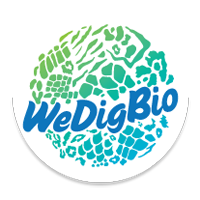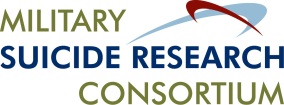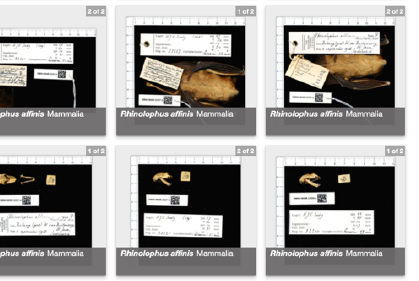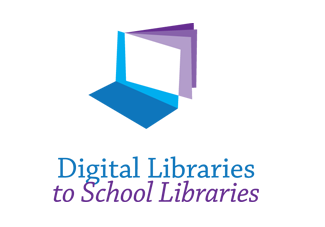iDigInfo Projects

iDigBio
Since 2011, iDigBio has served as the US National Science Foundation’s National Resource for Advancing Digitization of Biodiversity Collections. “Digitization” in this context means the creation of digital data and media (e.g., digital images) about biodiversity specimens. These specimens include insects on pins, fish in jars, fossils in drawers, and plants on sheets and are critical to research that puts present day distribution in context and models the future of Earth’s biome. These collections can be found in such various institutional settings as museums, botanical gardens, universities, field stations, government research centers, and elsewhere.
iDigBio has historically been composed of five domains, with four at University of Florida and the fifth—the Digitization, Workforce Development, and Participatory Science Domain—at Florida State University’ Institute for Digital Information and Scientific Communication. FSU’s iDigBio activities focus on increasing the rate, scope, efficiency, quality, and downstream fitness-for-use of digital data creation about specimens and collecting events, identifying and building core data creation and management competencies among biodiversity collections staff, and building support for digitization, data management, and workforce development among biodiversity collections administrators to sustain the activities. The FSU iDigBio domain accomplishes its goals through leadership and participation in a mix of deliverables, including workshops, symposia, conferences, webinars, working groups, white papers, peer-reviewed papers, professional meeting talks and posters, professional organization liaisons, and online content.
iDigInfo Director Austin Mast is co-PI on the current iDigBio Phase 3 grant (2021–26; $20 million) with four co-PIs from UF’s Florida Museum of Natural History and UF’s Advanced Computing and Information System’s Laboratory, as well as important new collaborators from the University of Kansas Biodiversity Institute and Natural History Museum. The grant supports graduate students, as well as three full-time staff at iDigInfo. For more information on the iDigBio Phase 3 grant, visit https://nsf.gov/awardsearch/showAward?AWD_ID=2027654

Digitization Academy
The Digitization Academy is a reformulation of the professional development offerings from iDigBio, packaging these into a set of complementary, recurring courses on high-value topics for those creating and using digital data about biodiversity. Since 2021, the academy has offered 12-hour courses, such as Introduction to Biodiversity Specimen Digitization, and 2-hour courses, such as Content Creation for Immersive Media focused on Biodiversity. Our core strategy involves combining three things in each course: (1) our systematic overview of the topic provides a foundation, (2) participants’ sharing animates the topic with motivation and nuance, and (3) an expert panel on the topic identifies the leading edge of what is possible. In 2025, the course catalog involves at seven offerings, including the popular Spanish-language version of our introductory course.
iDigInfo Workforce Development Manager with iDigBio, Kalina Jakymec, manages the Digitization Academy, and iDigInfo Digitization Resources Manager with iDigBio, Fritz Pichardo Marcano, teaches the Spanish-language version of courses. iDigInfo Director, Austin Mast, teaches in each of the English-language versions of courses. iDigInfo Application Developer, Robert Bruhn, maintains the Digitization Academy software.

WeDigBio
The Worldwide Engagement for Digitizing Biocollections (WeDigBio) project provides resources for biodiversity research collections to effectively and creatively engage their local communities and global internet users in digitization of specimens and associated content, especially during two annual WeDigBio events, with an emphasis on increasing the science literacy of participants, growing the variety of science contributors, and expanding the relevance of collections to solving humanity’s grand challenges. It leverages the easily understood, deeply historical biodiversity specimen collecting process, the visually compelling, data-laden specimens, the straightforward digitization activities, and the engaging stories of discovery enabled by the specimens and digital data to engage an ever-expanding group of public participants, collection professionals, educators, and others in activities that further biodiversity research, conservation, and management.
iDigInfo Director Austin Mast currently serves as Co-Chair of the WeDigBio Board and served as a founder of this collaboration that has included the Smithsonian Institution, the Australian Museum, the Paris National Museum of Natural History, and many other organizations. iDigInfo Application Developer Robert Bruhn maintains WeDigBio software, including the event dashboard. The first WeDigBio event was held in 2015.

BIOSPEX
BIOSPEX is a base camp for launching, advertising, and managing targeted efforts to digitize the world's 3 billion biodiversity research specimens in ways that involve the public. Such specimens include fish in jars, plants on sheets, fossils in drawers, insects on pins, and many other types. “Digitization” is a broad reference to creating digital data about the physical specimens and includes things like recording the what, when, where from the specimen label or describing the life stage of the specimen at time of collection. BIOSPEX enables you to package projects in one or a series of digitization expeditions, launch the expeditions at crowdsourcing tools, widely recruit others to participate, and layer resources on the experience to advance science literacy. In the end, you can download the new data for specimen curation, research, conservation, natural resource management, public policy, or other activities.
iDigInfo Director Austin Mast serves as project lead for BIOSPEX, and iDigInfo Application Developer Robert Bruhn maintains the BIOSPEX software.








